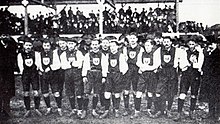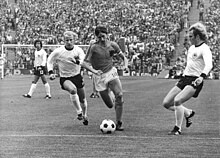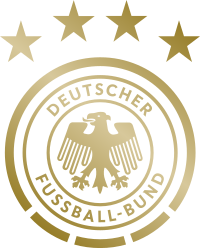A | B | C | D | E | F | G | H | CH | I | J | K | L | M | N | O | P | Q | R | S | T | U | V | W | X | Y | Z | 0 | 1 | 2 | 3 | 4 | 5 | 6 | 7 | 8 | 9
The Germany national football team (German: Deutsche Fußballnationalmannschaft) represents Germany in men's international football and played its first match in 1908.[7] The team is governed by the German Football Association (Deutscher Fußball-Bund), founded in 1900.[11][12] Between 1949 and 1990, separate German national teams were recognised by FIFA due to Allied occupation and division: the DFB's team representing the Federal Republic of Germany (commonly referred to as West Germany in English between 1949 and 1990), the Saarland team representing the Saar Protectorate (1950–1956) and the East Germany team representing the German Democratic Republic (1952–1990). The latter two were absorbed along with their records;[13][14] the present team represents the reunified Federal Republic. The official name and code "Germany FR (FRG)" was shortened to "Germany (GER)" following reunification in 1990.
Germany is one of the most successful national teams in international competitions, having won four World Cups (1954, 1974, 1990, 2014), tied with Italy, and only one less than the most successful team, Brazil. Having won three European Championships (1972, 1980, 1996) Germany is along with Spain the record holder in that international competition. Germany won also a Confederations Cup (2017).[11] They have also been runners-up at the European Championship three times, and four times at the World Cup, with a further four third-place finishes at the World Cup.[11] East Germany won Olympic Gold in 1976.[15] Germany is also one of the only two nations to have won both the FIFA World Cup and the FIFA Women's World Cup (the other being Spain).[16][17] By combined World Cups, Germany stands as the most successful football nation in history with six World Cups – four for the men's team and two for the women's. At the end of the 2014 World Cup, Germany earned the second highest Elo rating of any national football team in history, with 2,223 points.[18] Germany is also the only European nation that has won a FIFA World Cup in the Americas.
History
Early years (1899–1942)

On 18 April 1897, an early international game on German soil was played in Hamburg when a selection team from the Danish Football Association defeated a selection team from the Hamburg-Altona Football Association, 5–0.[19][20]
Between 1899 and 1900, prior to the formation of a national team, there were five international matches between Germany and English selection teams, which are today not recognised as official by either nation's football association (in part because England fielded their amateur side, which was an overflow or B team). All five matches ended in large defeats for the Germany teams, including a 12–0 loss at White Hart Lane in September 1901.[21] Eight years after the establishment of the German Football Association (DFB) in 1900, the first official match of the Germany national football team[d] was played on 5 April 1908, against Switzerland in Basel, with the Swiss winning 5–3.[7] A follow-up to the earlier series between England Amateurs and Germany occurred in March 1909 at Oxford's White House Ground[22] and resulted in Germany's largest official defeat to date: 9–0 (this time, the match was recognised and recorded as official by the DFB but not by the FA, again due to the amateur side being fielded).[21] These early confrontations formed the beginning of the rich rivalry between the two teams: one of the longest and most enduring international rivalries in football.[23]
Julius Hirsch was the first Jewish player to represent the Germany national football team, which he joined in 1911.[24][25] Hirsch scored four goals for Germany against the Netherlands in 1912, becoming the first German to score four goals in a single match.[26][27]

Gottfried Fuchs scored a world record 10 goals for Germany in a 16–0 win against Russia at the 1912 Olympics in Stockholm on 1 July, becoming the top scorer of the tournament; his international record was not surpassed until 2001 when Australia's Archie Thompson scored 13 goals in a 31–0 defeat of American Samoa.[28] He was Jewish, and the German Football Association erased all references to him from their records between 1933 and 1945.[29][30] As of 2016, he was still the top German scorer for one match.[31]
At that time the players were selected by the DFB, as there was no dedicated coach. The first manager of the Germany national team was Otto Nerz, a school teacher from Mannheim, who served in the role from 1926 to 1936.[32] The German FA could not afford travel to Uruguay for the first World Cup staged in 1930 during the Great Depression, but finished third in the 1934 World Cup in their first appearance in the competition. After a poor showing at the 1936 Olympic Games in Berlin, Sepp Herberger became coach. In 1937 he put together a squad which was soon nicknamed the Breslau Elf (the Breslau Eleven) in recognition of their 8–0 win over Denmark in the then German city of Breslau, Lower Silesia (now Wrocław, Poland).[33][34]
After Austria became part of Germany in the Anschluss of March 2, 1938, the Austrian national team – one of Europe's best sides at the time due to professionalism – was disbanded despite having already qualified for the 1938 World Cup. Nazi politicians ordered five or six ex-Austrian players, from the clubs Rapid Vienna, Austria Vienna, and First Vienna FC, to join the "all-German" team on short notice in a staged show of unity for political reasons. At the 1938 World Cup in France, this "united" Germany national team managed only a 1–1 draw against Switzerland and then lost the replay 2–4 in front of a hostile crowd in Paris. That early exit stands as Germany's worst World Cup result, and one of just three occasions the team failed to progress from the group stage – the next would not occur until the 2018 tournament, and it would be repeated in 2022.
During World War II, the team played over 30 international games between September 1939 and November 1942. National team games were then suspended, as most players had to join the armed forces. Many of the national team players were gathered together under coach Herberger as Rote Jäger through the efforts of a sympathetic air force officer trying to protect the footballers from the most dangerous wartime service.
Three Germany national teams (1945–1990)
After World War II, Germany was banned from competition in most sports until 1950. The DFB was not a full member of FIFA, and none of the three new German states – West Germany, East Germany, and Saarland – entered the 1950 World Cup qualifiers.
The Federal Republic of Germany, which was referred to as West Germany, continued the DFB. With recognition by FIFA and UEFA, the DFB maintained and continued the record of the pre-war team. Switzerland was the first team that played West Germany in 1950,[35] with the latter qualifying for the 1954 World Cup and the former hosting it.
The Saarland, a French protectorate between 1947 and 1956, did not join French organisations, and was barred from participating in pan-German ones. It sent their own team to the 1952 Summer Olympics and to the 1954 World Cup qualifiers. In 1957, Saarland acceded to the Federal Republic of Germany.
In 1949, the communist German Democratic Republic (East Germany) was founded. In 1952 the Deutscher Fußball-Verband der DDR (DFV) was established and the East Germany national football team took to the field. They were the only team to beat the 1974 FIFA World Cup winning West Germans in the only meeting of the two sides of the divided nation. East Germany won the gold medal at the 1976 Olympics. After German reunification in 1990, the eastern football competition was reintegrated into the DFB.
1954 World Cup victory

West Germany, captained by Fritz Walter, met in the 1954 World Cup against Turkey, Yugoslavia and Austria. When playing favourites Hungary in the group stage, West Germany lost 3–8, and faced the Hungarian "Mighty Magyars" again in the final. Hungary had gone unbeaten for 32 consecutive matches, and West Germany snapped the streak by winning 3–2, with Helmut Rahn scoring the winning goal.[36] The success is called "The Miracle of Bern" (Das Wunder von Bern).[37]
Memorable losses: Wembley goal and game of the century (1958–1970)
After finishing fourth in the 1958 World Cup and reaching only the quarter-finals in the 1962 World Cup, the DFB made changes. Professionalism was introduced, and the best clubs from the various Regionalligas were assembled into the new Bundesliga. In 1964, Helmut Schön took over as coach, replacing Herberger who had been in office for 28 years.
In the 1966 World Cup, West Germany reached the final after beating the USSR in the semi-final, facing hosts England. In extra time, the first goal by Geoff Hurst was one of the most contentious goals in the history of the World Cup: the linesman signalled the ball had crossed the line for a goal, after bouncing down from the crossbar, when replays showed it did not appear to have fully crossed the line. Hurst then scored another goal giving England a 4–2 win.[38][39]
West Germany in the 1970 World Cup knocked England out in the quarter-finals 3–2, before they suffered a 4–3 extra-time loss in the semi-final against Italy. This match with five goals in extra time is one of the most dramatic in World Cup history, and is called the "Game of the Century" in both Italy and Germany.[40][41] West Germany claimed third by beating Uruguay 1–0. Gerd Müller finished as the tournament's top scorer with 10 goals.
1974 World Cup title on home soil

In 1971, Franz Beckenbauer became captain of the national team, and he led West Germany to victory at the European Championship at Euro 1972, defeating the Soviet Union 3–0 in the final.[42][43]
As hosts of the 1974 World Cup, they won their second World Cup, defeating the Netherlands 2–1 in the final in Munich.[44] Two matches in the 1974 World Cup stood out for West Germany. The first group stage saw a politically charged match as West Germany played a game against East Germany. The East Germans won 1–0 but it made a scant difference to West Germany as the West Germans advanced to the knockout stage.[45] The West Germans advanced to the final against the Johan Cruijff-led Dutch team and their brand of "Total Football". The Dutch took the lead from a penalty. However, West Germany tied the match on a penalty by Paul Breitner, and won it with Gerd Müller's fine finish soon after.[46][47]
Late 1970s and early 1980s

West Germany failed to defend their titles in the next two major international tournaments. They lost to Czechoslovakia in the UEFA Euro 1976 final in a penalty shootout 5–3,[48] their last penalty shootout loss in a major tournament as of 2022.[49]
In the 1978 World Cup, Germany was eliminated in the second group stage after losing 3–2 to Austria. Schön retired as coach afterward, and the post was taken over by his assistant, Jupp Derwall.
West Germany's first tournament under Derwall was successful, as they earned their second European title at Euro 1980 after defeating Belgium 2–1 in the final.[50] West Germany started the 1982 World Cup with a 1–2 upset by newcomers Algeria in their first match,[51] but advanced to the second round with a controversial 1–0 win over Austria. In the semi-final against France, they tied the match 3–3 and won the penalty shootout 5–4.[52][53] In the final, they were defeated by Italy 1–3.[54]
During this period, West Germany's Gerd Müller racked up fourteen goals in two World Cups (1970 and 1974). His ten goals in 1970 are the third-most ever in a tournament. Müller's all-time World Cup record of 14 goals was broken by Ronaldo in 2006; this was then further broken by Miroslav Klose in 2014 with 16 goals.[55]
Beckenbauer's managing success (1984–1990)

After West Germany were eliminated in the first round of Euro 1984, Franz Beckenbauer returned to the national team to replace Derwall as manager.[56] At the 1986 World Cup in Mexico, West Germany finished as runners-up for the second consecutive tournament after beating France 2–0 in the semi-finals, but losing to the Diego Maradona-led Argentina in the final, 2–3.[57][58] In Euro 1988, after drawing Italy 1–1 and beating both Denmark and Spain 2–0 in the group stage,[59] West Germany's hopes of winning the tournament on home soil were spoiled by the Netherlands, as the Dutch beat them 2–1 in the semi-finals.[60][61]
At the 1990 World Cup in Italy, West Germany won their third World Cup title, in its unprecedented third consecutive final appearance.[62] Captained by Lothar Matthäus, they defeated Yugoslavia (4–1), UAE (5–1), the Netherlands (2–1), Czechoslovakia (1–0), and England (1–1, 4–3 on penalty kicks) on the way to a final rematch against Argentina in Rome.[63][64] West Germany won 1–0, with the only goal being a penalty scored in the 85th minute by Andreas Brehme.[62] Beckenbauer, who won the World Cup as the national team's captain in 1974, thus became the first person to win the World Cup as both captain and manager,[56] and the second to win as player and manager, after Mario Zagallo of Brazil.
Olympic football
| Medal record | ||
|---|---|---|
| Summer Olympic Games | ||
| 1976 Montreal | Team | |
| 1980 Moscow | Team | |
| 1964 Tokyo | Team | |
| 1972 Munich | Team | |
| 1988 Seoul | Team | |
East Germany did however achieve significantly greater success in Olympic football than the amateur teams fielded by the Western NOC of Germany due to using its elite players from the top domestic league. In 1956, 1960, and 1964 both states had sent a United Team of Germany. For 1964, the East German side had beaten their Western counterparts in order to be selected. They went on to win the bronze medal for Germany. As GDR, they won bronze in 1972 in Munich, gold in 1976 in Montreal, and silver in 1980 in Moscow.
Prior to 1984, Olympic football was an amateur event, meaning that only non-professional players could participate.[e] Due to this, West Germany was never able to achieve the same degree of success at the Olympics as at the World Cup. The first medal coming in the 1988 Olympics, when they won the bronze medal after beating Italy 3–0 in the 3rd place match.[65] West Germany also reached the second round in both 1972 and 1984. On the other hand, due to having an ability to field its top-level players who were classified as amateurs on a technicality East Germany did better, winning a gold, a silver and two bronze medals (one representing the United Team of Germany).
Berti Vogts years (1990–1998)

>Text je dostupný pod licencí Creative Commons Uveďte autora – Zachovejte licenci, případně za dalších podmínek. Podrobnosti naleznete na stránce Podmínky užití.
Text je dostupný za podmienok Creative
Commons Attribution/Share-Alike License 3.0 Unported; prípadne za ďalších
podmienok.
Podrobnejšie informácie nájdete na stránke Podmienky
použitia.


